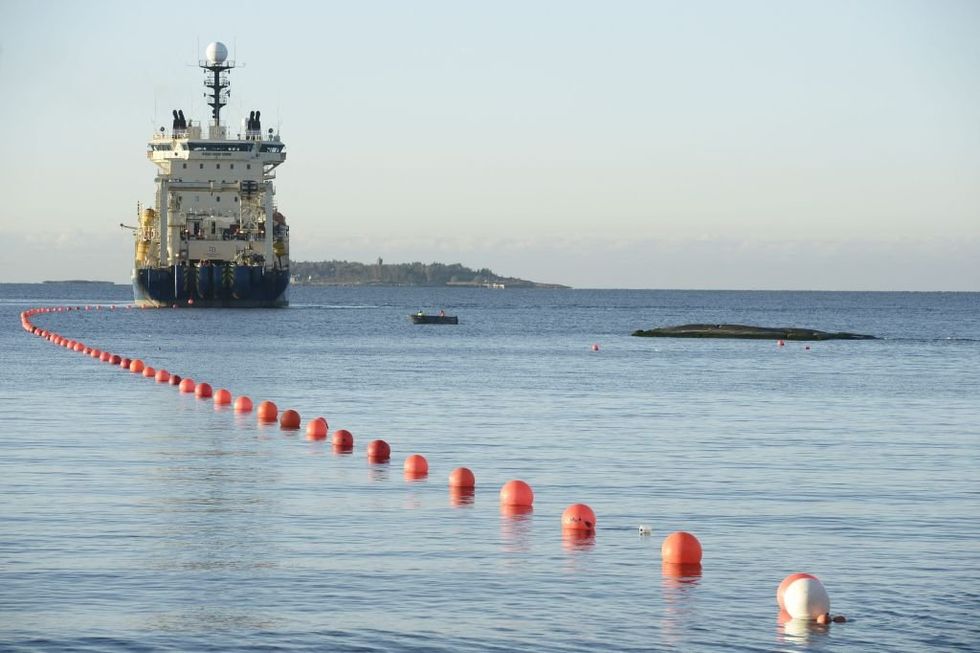Undersea internet cable possibly severed in Baltic Sea, sparking concerns about sabotage
The 745-mile underwater internet cable linking NATO allies Finland and Germany was apparently severed in the Baltic Sea Monday morning, sparking concerns about possible sabotage. The cybersecurity and telecoms network company Cinia said in a statement that a "fault" was initially detected in its C-Lion1 submarine cable — the only undersea cable connecting Finland to Central Europe — just after 4 a.m. on Monday, killing the services provided over the line. According to Cinia, it could take anywhere from five to 15 days for cable repairs and to get a clearer sense of what precisely is responsible. Telia Lietuva AB, one of the Baltic states' biggest telecommunication companies, told Bloomberg that the incident took place just hours after an undersea cable linking Lithuania to Sweden's Gotland island, nearly 33 feet away from the Finnish line, was cut. Their allusion to Russian aggression prompted some to speculate that Moscow may have severed the line — possibly in a similar manner to how senior Ukrainian military officers and businessmen allegedly sapped the Nord Stream 1 and 2 pipelines in September 2022. Elina Valtonen, the Finnish minister of foreign affairs, and her German counterpart, Annalena Baerbock, said in a joint statement, "We are deeply concerned about the severed undersea cable connecting Finland and Germany in the Baltic Sea. The fact that such an incident immediately raises suspicions of intentional damage speaks volumes about the volatility of our times." After noting that an investigation into the incident is underway, the duo stressed that "European security is not only under threat from Russia's war of aggression against Ukraine, but also from hybrid warfare by malicious actors. Safeguarding our shared critical infrastructure is vital to our security and the resilience of our societies." Their allusion to Russian aggression prompted some to speculate that Moscow may have severed the line — possibly in a similar manner to how senior Ukrainian military officers and businessmen allegedly sapped the Nord Stream 1 and 2 pipelines in September 2022. A line-cutting in the area would have been risky business for the Russians given that just days before the malfunction, NATO allies took part in an anti-submarine warfare exercise in the Baltic Sea and likely had some assets in the area. "The Baltic Sea is a challenging operational environment. The local expertise of our regional Allies facilitates success here and rehearsing command and control ensures the effective use of assets," Royal Danish Navy Commodore Thomas Stig Rasmussen said of the maritime exercises that ran from Nov. 11-14. "Training together in Swedish waters offers Allies an important opportunity to enhance interoperability, which is the key to success in real life operations. Our new Allies in Sweden and Finland have redefined how NATO approaches maritime security in the region." When pressed on whether the Finnish cable showed signs of sabotage, Cinia CEO Ari-Jussi Knaapila indicated there was "no way to assess the reason right now." "We can say that such damage doesn't happen without some kind of external impact," Knaapila told Bloomberg, citing ship anchors and bottom trawling as possible causes. Knaapila ruled out seismic activity and suggested sabotage has not been eliminated as a possibility. Ship anchors have done serious damage to undersea cables in recent years. On Oct. 8, 2023, two telecom cables and a rupture to a Baltic Sea gas pipeline were caused by the Hong Kong-flagged cargo vessel Newnew Polar Bear. After months of investigation and finger-pointing, Beijing finally admitted the error in August. Samuli Bergström, communications chief of the Finnish transport and communications agency, told Deutsche Welle, "The reasons are under investigation. Disturbances occur from time to time and there can be various reasons. For example, they are susceptible to weather and damage caused by shipping. The essential thing is that the problems are identified and corrective measures are taken." Like Blaze News? Bypass the censors, sign up for our newsletters, and get stories like this direct to your inbox. Sign up here!


The 745-mile underwater internet cable linking NATO allies Finland and Germany was apparently severed in the Baltic Sea Monday morning, sparking concerns about possible sabotage.
The cybersecurity and telecoms network company Cinia said in a statement that a "fault" was initially detected in its C-Lion1 submarine cable — the only undersea cable connecting Finland to Central Europe — just after 4 a.m. on Monday, killing the services provided over the line.
According to Cinia, it could take anywhere from five to 15 days for cable repairs and to get a clearer sense of what precisely is responsible.
Telia Lietuva AB, one of the Baltic states' biggest telecommunication companies, told Bloomberg that the incident took place just hours after an undersea cable linking Lithuania to Sweden's Gotland island, nearly 33 feet away from the Finnish line, was cut.
Their allusion to Russian aggression prompted some to speculate that Moscow may have severed the line — possibly in a similar manner to how senior Ukrainian military officers and businessmen allegedly sapped the Nord Stream 1 and 2 pipelines in September 2022.
Elina Valtonen, the Finnish minister of foreign affairs, and her German counterpart, Annalena Baerbock, said in a joint statement, "We are deeply concerned about the severed undersea cable connecting Finland and Germany in the Baltic Sea. The fact that such an incident immediately raises suspicions of intentional damage speaks volumes about the volatility of our times."
After noting that an investigation into the incident is underway, the duo stressed that "European security is not only under threat from Russia's war of aggression against Ukraine, but also from hybrid warfare by malicious actors. Safeguarding our shared critical infrastructure is vital to our security and the resilience of our societies."
Their allusion to Russian aggression prompted some to speculate that Moscow may have severed the line — possibly in a similar manner to how senior Ukrainian military officers and businessmen allegedly sapped the Nord Stream 1 and 2 pipelines in September 2022.
A line-cutting in the area would have been risky business for the Russians given that just days before the malfunction, NATO allies took part in an anti-submarine warfare exercise in the Baltic Sea and likely had some assets in the area.
"The Baltic Sea is a challenging operational environment. The local expertise of our regional Allies facilitates success here and rehearsing command and control ensures the effective use of assets," Royal Danish Navy Commodore Thomas Stig Rasmussen said of the maritime exercises that ran from Nov. 11-14. "Training together in Swedish waters offers Allies an important opportunity to enhance interoperability, which is the key to success in real life operations. Our new Allies in Sweden and Finland have redefined how NATO approaches maritime security in the region."
When pressed on whether the Finnish cable showed signs of sabotage, Cinia CEO Ari-Jussi Knaapila indicated there was "no way to assess the reason right now."
"We can say that such damage doesn't happen without some kind of external impact," Knaapila told Bloomberg, citing ship anchors and bottom trawling as possible causes.
Knaapila ruled out seismic activity and suggested sabotage has not been eliminated as a possibility.
Ship anchors have done serious damage to undersea cables in recent years. On Oct. 8, 2023, two telecom cables and a rupture to a Baltic Sea gas pipeline were caused by the Hong Kong-flagged cargo vessel Newnew Polar Bear. After months of investigation and finger-pointing, Beijing finally admitted the error in August.
Samuli Bergström, communications chief of the Finnish transport and communications agency, told Deutsche Welle, "The reasons are under investigation. Disturbances occur from time to time and there can be various reasons. For example, they are susceptible to weather and damage caused by shipping. The essential thing is that the problems are identified and corrective measures are taken."
Like Blaze News? Bypass the censors, sign up for our newsletters, and get stories like this direct to your inbox. Sign up here!
Originally Published at Daily Wire, World Net Daily, or The Blaze
What's Your Reaction?

































































































